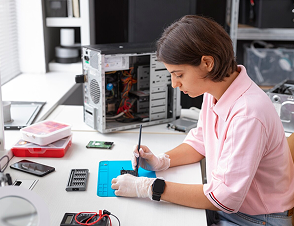
However, there’s quite a debate over the internet, especially Reddit, regarding the differences and similarities between these two roles.
We’ll go over the differences between these two roles in detail, but here’s a quick overview:
A pharmacy assistant primarily handles administrative tasks like maintaining inventory and patient information, and based on their training, can assist pharmacists.
A pharmacy technician is an advanced role that requires you to fill prescriptions, compound medications (sterile and non-sterile), and manage inventory.
Pharmacy Assistant vs Pharmacy Technician: Difference Overview
|
What Does a Pharmacy Assistant Do?
Much like other assisting roles, pharmacy assistants act primarily as a support to senior pharmacy technicians or pharmacists.
Some of the roles and responsibilities of a pharma assistant include:
- Stocking the shelves with OTC medications
- Maintaining and managing inventory
- Ordering supplies as required
- Handling customers and transactions
- Keeping the pharmacy clean
- Answering phones
- Preparing insurance claim forms
- Printing labels
While this role does have fewer responsibilities compared to a pharma technician, assistants are an essential part of pharmacies. They usually work in retail or grocery store pharmacies.
How to Become a Pharmacy Assistant?
Becoming a pharmacy assistant is relatively easy.
Firstly, you need at least a high school diploma or GED to apply for this position.
Next, you should gain appropriate training for the role, i.e., becoming familiar with common medications and HIPAA regulations.
However, some employers may be more than happy to provide you with on-the-job training.
NOTE: While certifications are not mandatory for this position, getting sterile and non-sterile compounding certifications can boost your employability.
Skills Required
- Good organization
- Reliability
- Good verbal and written communication
- Basic maths
- Attention to detail
- Customer service
How Much Do Pharmacy Assistants Make?
According to ZipRecruiter, the average salary for a pharmacy assistant in the US is $39,804 annually or $19 per hour.
While there is no official data available, experts predict that jobs for pharmacy assistants are likely to decline.
What Does a Pharmacy Technician Do?
While some duties of a pharma tech overlap with those of an assistant, this is a more advanced role.
Some of the roles and responsibilities of a pharma tech include:
- Filling prescriptions and dispensing medications
- Running inventory audits and ordering stock
- Answering patient questions regarding dosage and side effects
- Compounding medication as per the healthcare provider’s instructions
- Assisting pharmacists, doctors, and nurses with prescriptions
- Handling controlled substances
With additional responsibilities, pharma techs usually work at hospital and clinic pharmacies.
How to Become a Pharmacy Technician?
Similar to the other role, you need at least a high school diploma or GED to apply for this position.
After that, you need to learn the basic anatomy and physiology, along with skills like pharmacy calculations.
Next, get certified by clearing the Pharmacy Technician Certification Exam (PTCB or ExCPT).
⇒You can learn everything for this role and get job-ready in just 25 weeks with CCI Training Center’s Pharmacy Technician Program.
Skill Required
- Detail-oriented
- Organized and efficient
- Ability to multitask
- Empathy and Good judgment
- Intermediate mathematical skills
- Excellent verbal and written communication
- Proficiency with Pharmacy Software and Technology
Explore our in-depth guide on how to become a pharma technician.
How Much Do Pharmacy Technicians Make?
According to the Bureau of Labor Statistics, pharma techs make $43,460 per year on average or $20.90 per hour.
As for job outlook, this role is projected to grow 7 percent from 2023 to 2033.
Which Career is Right for You?
We understand that choosing either of these careers can be overwhelming. Let’s make the choice easier for you.
Choose Pharmacy Assistant if you:
- Want to enter the workforce in weeks, not months
- Prefer front-desk interaction over technical tasks
- Aren’t ready for certification yet
Choose Pharmacy Technician if you:
- Enjoy science, detail-oriented work, and problem-solving
- Want higher pay and clearer advancement tracks
- May someday bridge into nursing, pharmacology, or even become a pharmacist
Quick Differences Summary
Pharmacy Assistant | Pharmacy Technician | |
| Typical Training | Short on-the-job training + short (40 hours) certifications | 4-9 month certificate + national certification |
| Daily Focus | Customer service, stocking, and clerical support | Filling & compounding Rx, insurance claims, and inventory control |
| Median Pay | $38,980 | $40,300 |
| 2023-33 Growth | +1% (slower than average) | +7% (faster than average) |
| Career Ladder | Limited; most move into Tech roles | Pharmacist, Medical laboratory technician, or Regulatory affairs specialist |
Final Words
Both roles are essential for pharmacies; however, pharma techs perform more crucial duties, and their demand is increasing.
Therefore, we recommend investing your time and resources into entering the healthcare industry as a pharmacy technician for a better salary and job security.
Program Offered
- Pharmacy Technician Training
- Online Medical Assistant
- Medical Billing and Coding Specialist Program
- Cloud Computing Technician Training
- Computer Network Technician
- Business and Accounting
- Radiology Technician Training
- Medical Assistant Program
- Computer Support Technician
- Cybersecurity Program
- Virtual Assistant Training
Program Offered
- Pharmacy Technician Training
- Online Medical Assistant
- Medical Billing and Coding Specialist Program
- Cloud Computing Technician Training
- Computer Network Technician
- Business and Accounting
- Radiology Technician Training
- Medical Assistant Program
- Computer Support Technician
- Cybersecurity Program
- Virtual Assistant Training
Frequently Asked Questions FAQ's
What’s the difference between a pharmacy assistant and a pharmacy tech?
Assistants focus on customer service and inventory, whereas techs handle medication prep, insurance claims, and regulated tasks.
Who makes more money, a pharmacy tech or an assistant?
Pharmacy techs make more money than assistants. However, the gap isn’t huge.
Can I become a pharmacist after gaining experience as a pharma assistant?
No, you cannot directly become a pharmacist. You need to train and work as a pharmacy technician or earn a bachelor’s degree.
What’s the difference between a pharmacy technician and a pharmacist?
Pharmacists hold a PharmD, verify prescriptions, counsel patients, and can administer vaccines in many states. Techs, on the other hand, prepare meds and manage operations but cannot provide clinical judgment.
Related Articles

















